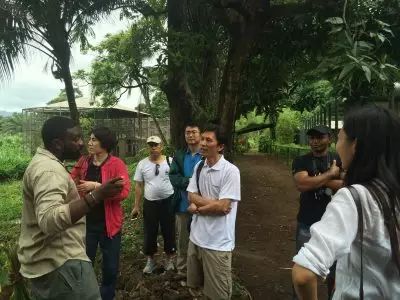Handshake, Kiss or Kotow? Understanding Chinese Business Culture
KINSHASA (July 16 – 22, 2017) –
GEI Program Officer Qianru Ma reflects, “Explaining to foreigners that for Chinese people, it’s not customary to always say ‘hi’ in the elevator or that it is uncommon to greet with a kiss lessens the perception that a Chinese investor is rude or impolite. This deeper understanding helps to create a better environment for communication.”

GEI meets several journalists in the Democratic Republic of Congo for cross-cultural training.
Photo Credit: GEI
Countless “how to do business in China” books teach foreign CEOs ways to enter the world’s second largest economy. Business students flock to China’s campuses to gain first-hand experience which they can then bring back home.
But this month, GEI revitalizes an important, but sometimes overlooked, concept at a one-day training and exchange for journalists in the Democratic Republic of Congo (DRC) on cross-cultural communication.
Bridging a Gap: Local Media, Foreign Investors, and Local Concerns
Having worked extensively with Chinese and African partners, GEI program officers share our work as an environmental NGO working abroad. We introduce Chinese business culture, while also gaining insight on Chinese investor perceptions in the DRC. In addition, we also provide a general landscape of Chinese investment around the world, including in Africa.
This training focused on increasing cultural understanding on both sides, using journalism as a vehicle. Specifically, the training activities identified ways civil society organizations could help facilitate the necessary dialogue and exchange between Chinese investors conducting sustainable investment projects in Africa and their African partners.

GEI speaks with a local timber enterprise employee on a field visit, as part of China-Africa timber governance project in 2016.
Photo Credit: GEI
We attempt to address two common problems that occur when Chinese investors invest abroad:
- Chinese enterprises fail to contact local media and/or fail to maintain communications.
- Cultural, language, and business differences have caused miscommunication and strained relations between stakeholders.
- Chinese investments in Africa lack diverse media coverage.
From our research, we’ve found that by working with local media and other local stakeholders, enterprises can improve their environmental impact assessment and provide a better landscape of factors facing their investment project. The fact is, local stakeholders have a wealth of knowledge to share, as they are more familiar with local laws, culture, environment, historical context, media, and even key opinion leaders.
Understanding Chinese investment in Africa
In order to build up more understanding of Chinese investors, GEI officers explained everything from frameworks of Chinese businesses and sectors to differences in Chinese management or policy systems to characteristics of Chinese companies to even basic Chinese customs.
To supplement our training, we invited an independent Chinese journalist, currently based in Germany, to give DRC participants a presentation on how to conduct field investigations in a country with different culture and language. She also provided external resources for DRC journalist, in order to help journalists prepare for their next assignment.

